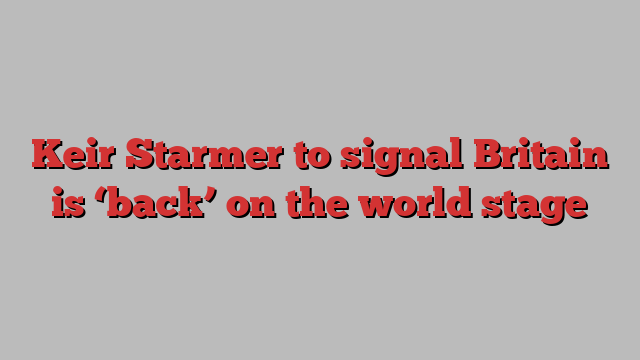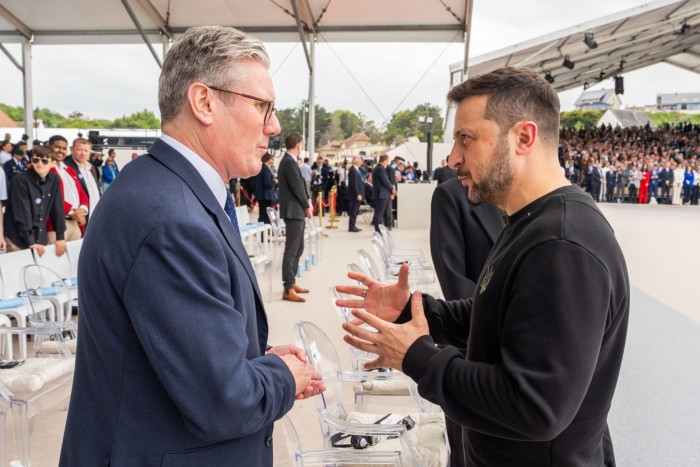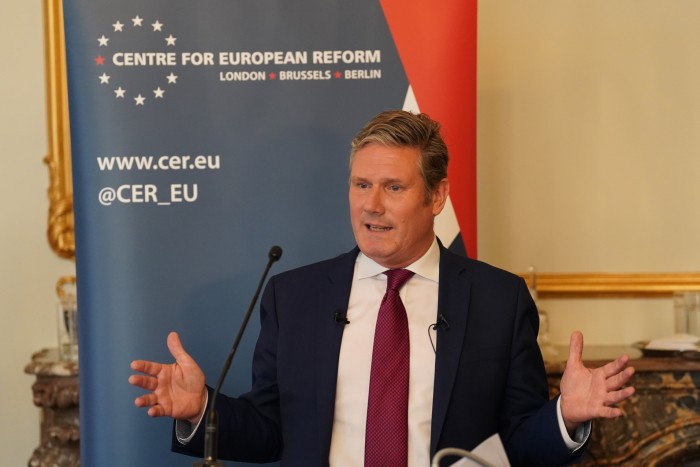
Sir Keir Starmer will use his first weeks in power to signal that Britain is “back” as a leading global player, as Labour prioritises three foreign policy resets — with Europe, the “global south” and on climate change.
The Labour leader will be thrust on to the world stage within days of Thursday’s general election if he becomes UK prime minister as expected, with Nato’s 75th anniversary summit in Washington starting on July 9.
He will also host European leaders in the UK two weeks after the election and is expected to sign a new bilateral security deal with Germany, which EU diplomats said could be finalised as early as August.
“There’s going to be a reset for the UK on the international stage. We will be serious about our obligations, we want to play more of a leading role on the global stage, and say that we’re back,” Starmer told the Financial Times.
His expected attendance at the Nato summit alongside US President Joe Biden, the leaders of 30 other Nato nations and Ukrainian President Volodymyr Zelenskyy, will allow Starmer to stress Britain’s continuing support for Kyiv.
But the European Political Community forum hosted by the UK at Blenheim Palace in Oxfordshire will provide Starmer with an opportunity to pivot from the Conservative government’s approach to relations with the EU.
Aides said the Labour leader would use the July 18 meeting of the EPC, the 47-member organisation, to communicate his desire to put the UK back at the heart of European affairs.
They added that both meetings would provide Starmer with an opportunity to develop a narrative of “deepening involvement with EU defence and industrial co-operation” as part of UK membership of Nato, and to share ideas for a new Border Command to tackle migration.
Together the Nato and EPC meetings represent a “huge opportunity for an incoming prime minister to make their mark on the top table”, according to Lord Peter Ricketts, former chief mandarin at the Foreign Office.

Two senior EU diplomats said Starmer could sign a new UK-Germany bilateral security co-operation deal — akin to the Lancaster House treaties agreed between France and the UK — within weeks of taking office. A Labour official also confirmed the plan.
One of the diplomats said a visit to Berlin by the new UK prime minister had been pencilled in as early as August. German chancellor Olaf Scholz heralds from the same socialist democratic political tradition as UK Labour. Starmer’s party has also singled out Ireland and Poland as two nations in Europe with which it wants to deepen ties.
Alongside retooling the UK’s relationship with the EU, Labour has indicated it would pursue two other foreign policy priorities in its first 100 days of government.
David Lammy, shadow foreign secretary, told the FT: “Our foreign policy would begin with three resets — with Europe, on climate and with the global south.”
The focus on climate action would centre on building an international “clean power alliance” to accelerate the “energy transition”, in step with the party’s plans to create new green jobs at home.
Labour officials said Lammy, if he becomes foreign secretary, is expected to undertake a new pace of engagement with, and travel to, Africa, Latin America and the Caribbean, collectively known as the global south.
The foreign secretary’s schedule for the first 100 days also includes the UN General Assembly in September, the Asean summit in October and, if the timings can be agreed, a trip to India.
In October Starmer is due to travel to Samoa for the Commonwealth heads of government meeting, the first time a Pacific Island nation will have hosted the summit, which meets every two years.
In Europe, Labour has already sketched out broader plans to pursue a new security pact with the EU, which party officials said could span energy policy and wider supply chains.
Starmer also wants to improve the EU-UK trading relationship by signing a veterinary agreement with the EU, to reduce border frictions over food products, and deals on musicians’ visas and on recognising the qualifications of professionals like lawyers and architects.

However, aides have cautioned against expectations that Starmer will move rapidly to improve the EU-UK trade deal, predicting that he will first seek to establish credibility within Europe.
“We can’t just charge in with a load of demands, we have to approach this with some degree of humility,” one Labour aide said.
Sir Ivan Rogers, former UK ambassador to the EU, warned: “You don’t go straight back to fighting the old fights of 2016 to 2019 — things like veterinary agreements and mobility deals — because to EU capitals, those are complex and ultimately third-order issues compared to existential security challenges we’re facing.”
Labour also wants to negotiate more structured dialogue between Britain and the EU. This could revolve around UK attendance at the EU’s foreign affairs council — a suggestion that has so far been privately rebuffed by European diplomats.
Olivia O’Sullivan, director of the UK in the world programme at the Chatham House think-tank, said it could be “straightforward” to schedule more regular, formalised engagement. But she warned the type of UK-EU defence consultation first proposed in 2018 may not necessarily still be on the table.
“A lot has changed since then, such as the Ukraine war, which has led the EU to focus on how to bolster their defence and defence industries. A lot of their more recent initiatives on this front . . . exclude third countries,” she said.
The hiatus — or “diplomatic air-gap” as one aide described it — before the new European Commission is installed in December leaves the UK an opportunity to use the summer and autumn to deepen relationships in EU capitals. “How we handle that is absolutely crucial,” said one Labour aide.
The outcome of the US presidential election in November will also loom large over the next prime minister’s agenda.
While Britain’s relationship with the US has strong foundations, spanning military links and intelligence-sharing partnerships, a second Donald Trump term in the White House could prove awkward for bilateral relations with a centre-left UK administration.
Trump’s hostility to climate action would sit uneasily with Starmer’s plans for greater cross-border collaboration.
More fundamentally, the Republican presidential candidate’s attitude towards Nato would determine the security backdrop in Europe. A more isolationist US could spook London and other European capitals into deeper UK-EU co-operation.
Starmer would need to make a number of key diplomatic appointments, including his foreign policy adviser and the next UK ambassador to Washington.
Labour advisers believe party grandees Douglas Alexander, former international development secretary who is poised to return as an MP; former foreign secretary David Miliband; and former business secretary Lord Peter Mandelson, could be in line for senior foreign policy roles.